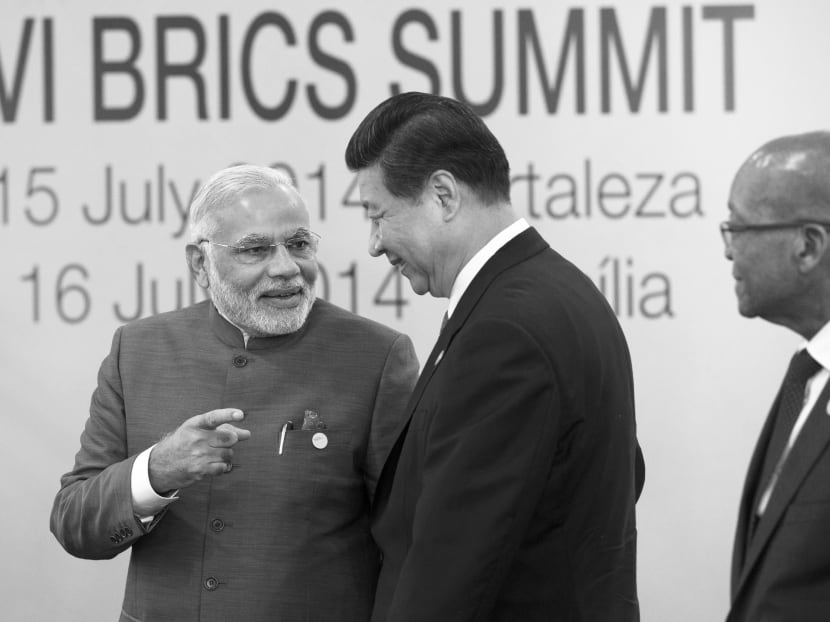Xi, Modi may bring about shift in Sino-Indian ties
The recent BRICS summit in Fortaleza, Brazil, saw the first meeting held between Indian Prime Minister Narendra Modi and Chinese President Xi Jinping.

Mr Xi (right) is aware that Mr Modi enjoys good relations
with Tokyo. It will not be in China’s interests if India and Japan
move closer at its expense. Photo: AP
The recent BRICS summit in Fortaleza, Brazil, saw the first meeting held between Indian Prime Minister Narendra Modi and Chinese President Xi Jinping.
Both leaders pledged to work towards a solution to their long-standing border dispute. Mr Modi described the talks as extremely fruitful, while Mr Xi extolled India as a long-lasting friend.
The meeting reflects the continuation of an upturn in Sino-Indian relations since Mr Modi’s ascension to power in India. The positive developments have led observers to ask whether there will be a shift in dynamics between the world’s two largest developing economies.
To couch the question in Chinese parlance: Are we seeing the emergence of a “new” type of major power relations between China and India?
CHINDIANOMICS
A factor that may play an increasingly bigger role in shaping China-India ties is economics.
Commercial relations between these Asian giants are still relatively modest. Sino-Indian trade of around US$65 billion (S$81.3 billion) last year is a trickle in the context of a combined annual gross domestic product of more than US$10 trillion. Last year, bilateral trade recorded a decrease for the second year running. This situation may soon change.
Mr Modi, who has campaigned successfully on promises of India’s economic rejuvenation, will look towards Beijing as a viable source of cooperation for achieving the “Indian dream”.
He will welcome greater Chinese investments in India, particularly in infrastructure building as well as the manufacturing and technology sectors.
Already, the two sides have signed a path-breaking Memorandum of Understanding on establishing joint industrial parks, providing a more coherent framework for Chinese investments in India.
Mr Modi will also seek to address the trade-deficit problem — a record of around US$31 billion last year — by pushing for greater Chinese market access for Indian IT and pharmaceutical exports.
Beijing has agreed that more can be done to address India’s mounting trade deficit with China. Economics remains China’s most effective foreign policy instrument globally. The Sino-Indian relationship is not an exception and Beijing will seek to boost bilateral economic cooperation.
With more than US$3.8 trillion in reserves, China is keen to invest more in India, seeing the country as a huge untapped market. This aligns with Chinese ambitions to establish a South Asian economic corridor through India, Bangladesh, Myanmar and China.
While a big part of China’s economic relations is driven by hard-nosed pragmatism, individual personalities are often part of the equation as well. In Mr Modi, China sees an “old friend” with whom it believes it can do business.
It was not lost on the Chinese that during Mr Modi’s time as Chief Minister of Gujarat, he visited China several times, took the trouble of printing his business card in Mandarin and made active efforts to court Chinese investment. Today, a significant amount of Chinese investment in India is concentrated in Gujarat.
STRATEGIC CONSIDERATIONS
Of course, economics, while vital, does not solely define the complex Sino-Indian relationship. Other important strategic factors are in play.
The current Chinese leadership sees India as a significant geopolitical and diplomatic actor, both regionally and globally, and Mr Xi has announced that India will be a “priority” for Chinese diplomacy.
The Chinese Foreign Ministry quoted Mr Xi as suggesting to Mr Modi that “China and India should jointly participate in the formulation of international rules so as to strengthen the voice of developing countries”.
China’s western periphery has grown in strategic importance for Beijing, in view of geopolitical pressures from America’s rebalance to Asia and its own declining reputation and relations in East Asia. China can ill afford to have further problems with neighbours on its western flank, especially a major power like India.
Beijing is also aware that Mr Modi enjoys good relations with Tokyo and that the Abe government is keen to boost ties with New Delhi. It will not be in China’s interests if India and Japan move closer at its expense.
For New Delhi, improved relations with China will help strengthen its bargaining position in regional politics (especially in relation to Pakistan), enhance its independent big power credentials and extend opportunities for bilateral security cooperation in areas such as counterterrorism.
The factors promoting convergence do not mean that extant mutual distrust and bilateral challenges, such as the Tibet issue and the border dispute, will become less relevant.
On the contrary, these differences will continue to cast a shadow over China-India ties and may even set the relationship back.
That said, there have been recent positive signals that some of the traditionally difficult bilateral knots may be further loosened. Signally, on the boundary question, China has indicated that it is prepared to reach a “final settlement” with India, reflecting an unusual degree of confidence and goodwill in dealing with the new Modi regime.
Overall, the outlook is one of cautious optimism for the trajectory of Sino-Indian relations. Enduring bilateral distrust and complications such as Tibet and the border dispute will continue to be major obstacles.
However, with “Chindianomics” figuring high in both governments’ estimations and New Delhi and Beijing seemingly committed to the advancement of strong ties, there appear to be good prospects for sustained positive momentum in Sino-Indian ties
Chinese Foreign Minister Wang Yi, who is also Mr Xi’s special envoy to India, has likened the Sino-Indian partnership to a “massive buried treasure”. Perhaps, some of that treasure is about to be uncovered.
ABOUT THE AUTHOR:
Hoo Tiang Boon is Assistant Professor with the China Programme at the S. Rajaratnam School of International Studies (RSIS). This commentary first appeared in RSIS Commentaries.






